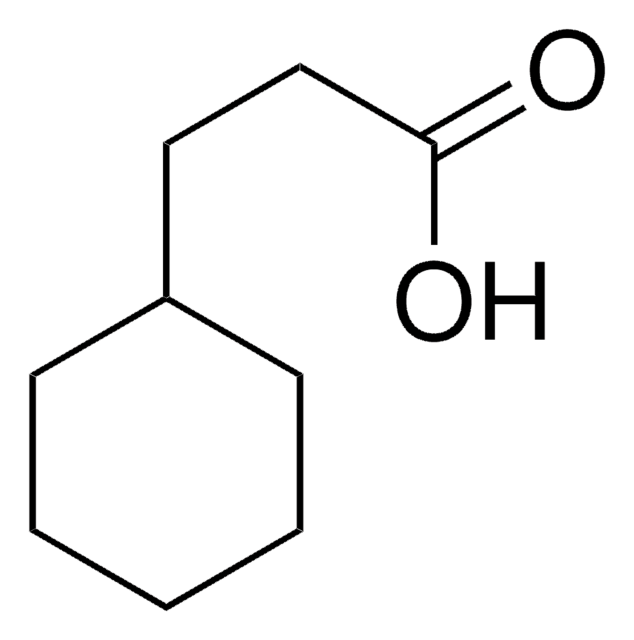538701
2-Ethylhexanoic acid
≥99%
Sinónimos:
2-Ethylcaproic acid
About This Item
Productos recomendados
vapor density
4.98 (vs air)
vapor pressure
<0.01 mmHg ( 20 °C)
10 mmHg ( 115 °C)
assay
≥99%
autoignition temp.
699 °F
expl. lim.
1.04 %, 135 °F
8.64 %, 188 °F
refractive index
n20/D 1.425 (lit.)
bp
228 °C (lit.)
density
0.903 g/mL at 25 °C (lit.)
SMILES string
CCCCC(CC)C(O)=O
InChI
1S/C8H16O2/c1-3-5-6-7(4-2)8(9)10/h7H,3-6H2,1-2H3,(H,9,10)
InChI key
OBETXYAYXDNJHR-UHFFFAOYSA-N
¿Está buscando productos similares? Visita Guía de comparación de productos
Categorías relacionadas
General description
It has various industrial applications, such as:
- coolant in automotives
- synthetic lubricant
- wetting agent
- co-solvent
- drying of paints
- defoaming agent in pesticides
Application
- A review of the environmental fate and aquatic effects of a series of C4 and C8 oxo-process chemicals.: This review assesses the environmental impact of C4 and C8 oxo-process chemicals, including 2-Ethylhexanoic acid, detailing their degradation, persistence, and effects on aquatic ecosystems (Staples, 2001).
signalword
Danger
hcodes
Hazard Classifications
Repr. 1B
Storage Class
6.1C - Combustible acute toxic Cat.3 / toxic compounds or compounds which causing chronic effects
wgk_germany
WGK 1
flash_point_f
237.2 °F - closed cup
flash_point_c
114 °C - closed cup
ppe
Eyeshields, Faceshields, Gloves, type ABEK (EN14387) respirator filter
Certificados de análisis (COA)
Busque Certificados de análisis (COA) introduciendo el número de lote del producto. Los números de lote se encuentran en la etiqueta del producto después de las palabras «Lot» o «Batch»
¿Ya tiene este producto?
Encuentre la documentación para los productos que ha comprado recientemente en la Biblioteca de documentos.
Los clientes también vieron
Nuestro equipo de científicos tiene experiencia en todas las áreas de investigación: Ciencias de la vida, Ciencia de los materiales, Síntesis química, Cromatografía, Analítica y muchas otras.
Póngase en contacto con el Servicio técnico










